Afcon upsets, SA gaming investment, Africori buyout
Hi Quartz Africa readers,
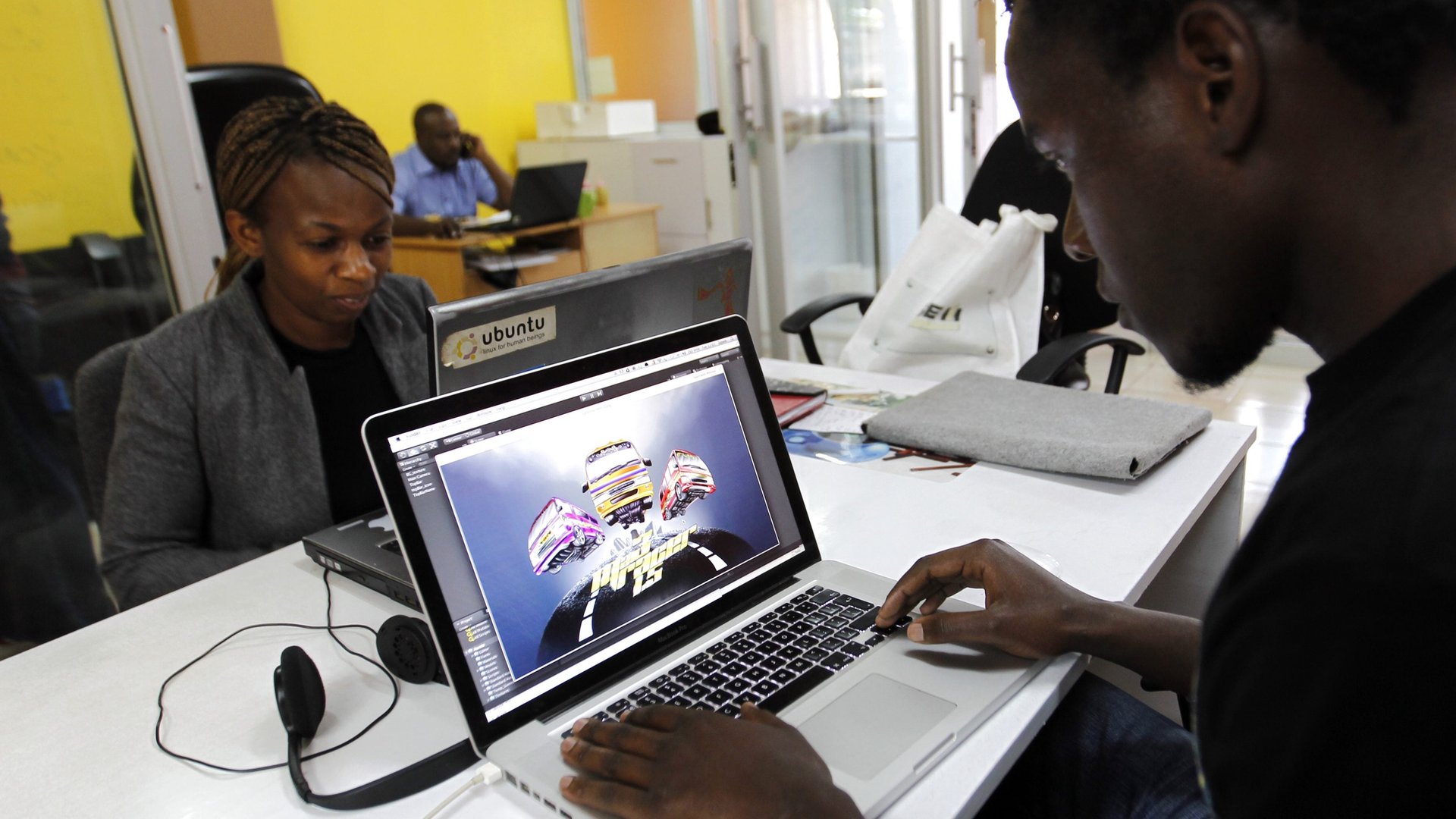

Hi Quartz Africa readers,
This oft-overlooked statistic came to mind this past week when Ghana’s foreign affairs ministry denied that it has been in negotiations “about a possible Ghana interest in a partnership agreement with the UK to host deported or returned migrants of Third Countries from the UK.”
The British government reportedly considered proposals to send migrants crossing the English channel to Ghana and Rwanda. Presumably, the intention would have been to deter migrants hailing from countries like Iran, Iraq, Sudan, and Syria from attempting to go to the UK if there was a chance they might end up elsewhere in the world.
The refugee responsibility (or burden, depending on your point of view) is unequally distributed. The top five host countries of refugees are Turkey, Colombia, Pakistan, Uganda, and Germany. Uganda hosts close to 1.5 million refugees compared to the US’s 338,000.
Though one of the poorer countries in Africa, Uganda is also one of the most hospitable places in the world. It gives refugees the right to freedom of movement, employment, education, and healthcare, as well as the right to start a business—that’s in addition to the government providing refugees land for farming and shelter. This is a grand contrast from most parts of the world where, even when fortunate enough to be granted asylum, refugees find themselves in quasi-citizen status for decades.
And while Ghana might not be hosting the UK’s migrants anytime soon, the idea should prompt us to reflect. What does it say of the global economy that the countries best placed to help are the least likely to do so—and the most likely to politicize the issue of those seeking solace at their borders? —Ciku Kimeria, Quartz Africa editor
Stories this week
Kenya refuses to release loan contracts for its Chinese-built railway. Last year, two Kenyan activists took the government to court over the standard-gauge railway. Carlos Mureithi writes about the government’s refusal to make the documents public, the secrecy surrounding Chinese contracts, and why Kenyans are concerned.
A South African gaming startup lands a hotshot US investor. Andreessen Horowitz is one of Silicon Valley’s most talked-about venture capital firm, thanks to a portfolio that includes Facebook, Airbnb, and Coinbase. Alexander Onukwue reports on its long-overdue first investment in Africa—a gaming startup with web3 ambitions.
Warner buys an African digital music distributor. Carlos Mureithi looks at the significance of the purchase by one of the music industry’s Big Three of Africori, a leading African digital music distribution, music rights management, and artist development company.
Africa’s EV revolution is rolling in on two wheels, not four. Global sales of electric vehicles may be booming, but they’re still rare in Africa. But a growing number of governments and investors are focusing on locally manufactured two- and three-wheeled vehicles, Tim McDonnell reports.
Mali pushes back against the Ecowas embargo. For failing to plan elections this year, Mali’s military junta received more sanctions from Ecowas this month, including the closure of land and air borders with other member countries. Alexander Onukwue examines how Mali is pushing back, including warning airlines to fly to the country or lose their landing spots.
Algeria exits Afcon after a humiliating performance. The reigning champions would never have predicted they would finish at the bottom of a list containing Sierra Leone and Equatorial Guinea, ranked 108 and 114 respectively by FIFA. Tolu Olasoji reports on the team’s surprisingly dismal performance.
Mapping east Africa’s poor football performance
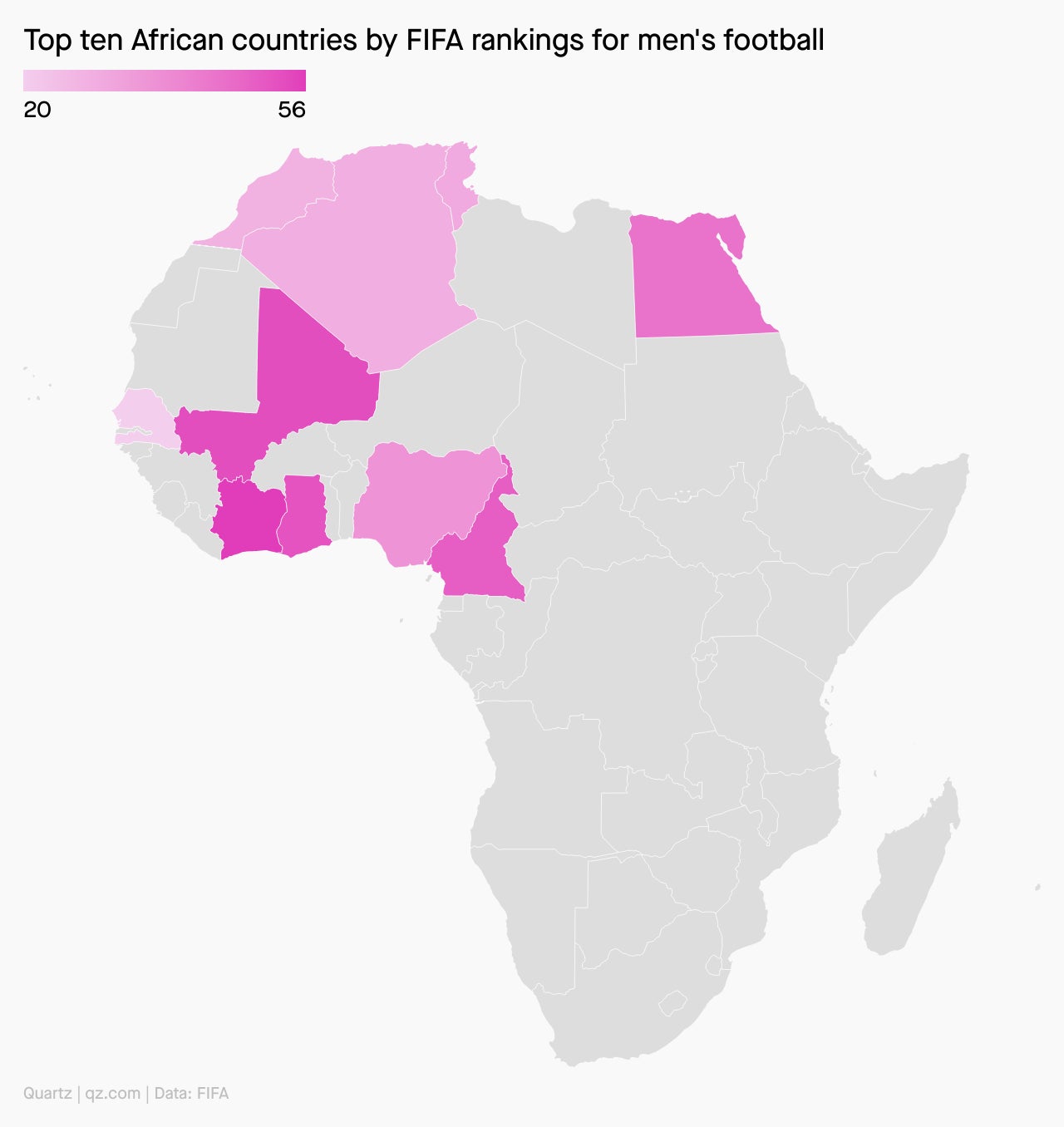
Africa’s biggest football tournament is well under way. After a competitive start, the best teams are now battling it out in Cameroon for a spot in the quarterfinals.
But while teams from the western, northern, and southern parts of the continent have been competing for this year’s title, one region is noticeably absent: East Africa. Priya Sippy reports on why an area known globally for athletic dominance just can’t seem to find its footing in the sport.
Spotlight on a Quartz Africa 2021 Innovator
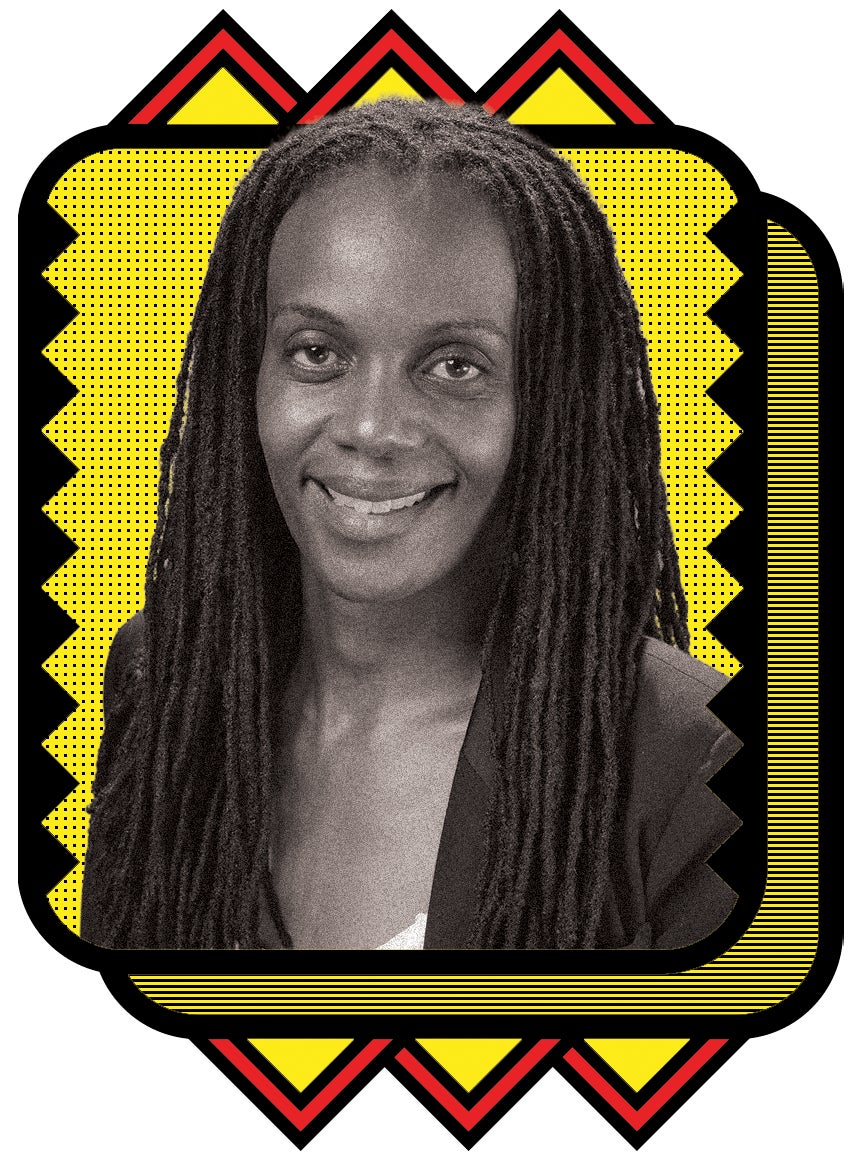
Catherine Nakalembe is the program director for NASA Harvest Africa, the space agency’s food security and agriculture program for Africa. She uses satellite remote sensing and machine learning to collect data to guide agricultural decision-making and improve the lives of smallholder farmers in Africa. She also provides support and coordination for NASA Harvest Africa’s activities in Kenya, Tanzania, and Uganda.
Nakalembe’s work focuses on policies and programs to shield farmers against the impacts of food failure. It has led to the creation of food-security and crop-monitoring bulletins that incorporate satellite data. In addition, Nakalembe designed a mechanism for a disaster-risk financing program in Uganda that has supported more than 300,000 households.
Nakalembe is also an associate research professor at the University of Maryland and a member of the NASA SERVIR Applied Sciences Team, which promotes applications of Earth observations to help developing countries assess the environment for better planning and action.
Check out Quartz Africa’s Innovators 2021 list, which showcases the pioneering work being done by Nakalembe and other female African innovators.
Dealmaker
Float, a Ghanaian startup that offers credit lines to businesses, raised $17 million through debt and equity funding. Tiger Global and JAM Fund, the investment firm of Tinder co-founder Justin Mateen, led the equity part of the round. Founded in 2020, Float serves businesses in Nigeria, too, and wants to set up operations in Kenya and South Africa.
Kenyan e-commerce company Copia Global received $50 million in an equity funding round led by Goodwell Investments, a Dutch firm whose Africa portfolio includes Paga and Max. Copia Global uses a spread of 30,000 agents (77% of whom are women) as the key network for getting goods to retailers. It has fulfilled 10 million orders to date and plans to venture into more African markets.
PAPS, a Senegalese logistics startup, raised $4.5 million in a round led by 4DX Ventures and telecom operator Orange, with Uma Ventures, Saviu Ventures, Yamaha Motor, Proparco, and other firms participating. PAPS helps small and large businesses store and deliver goods, catering to 70% of all pharmacies in Senegal, according to CEO Bamba Lo.
Quartz Gems
China’s post-pandemic problems. China’s economy recovered substantially from the pandemic last year: Even with a slow second half, GDP expanded by 8.1% over 2020, beating Beijing’s 6% target. But once covid-related threats to the economy abate, the country will have to contend with a historically low birth rate: 7.52 births per 1,000 people in 2021.
Overall, the country recorded around 10.6 million births and 10.1 million deaths last year, meaning its 1.4 billion-strong population had a net increase of just 480,000 people.
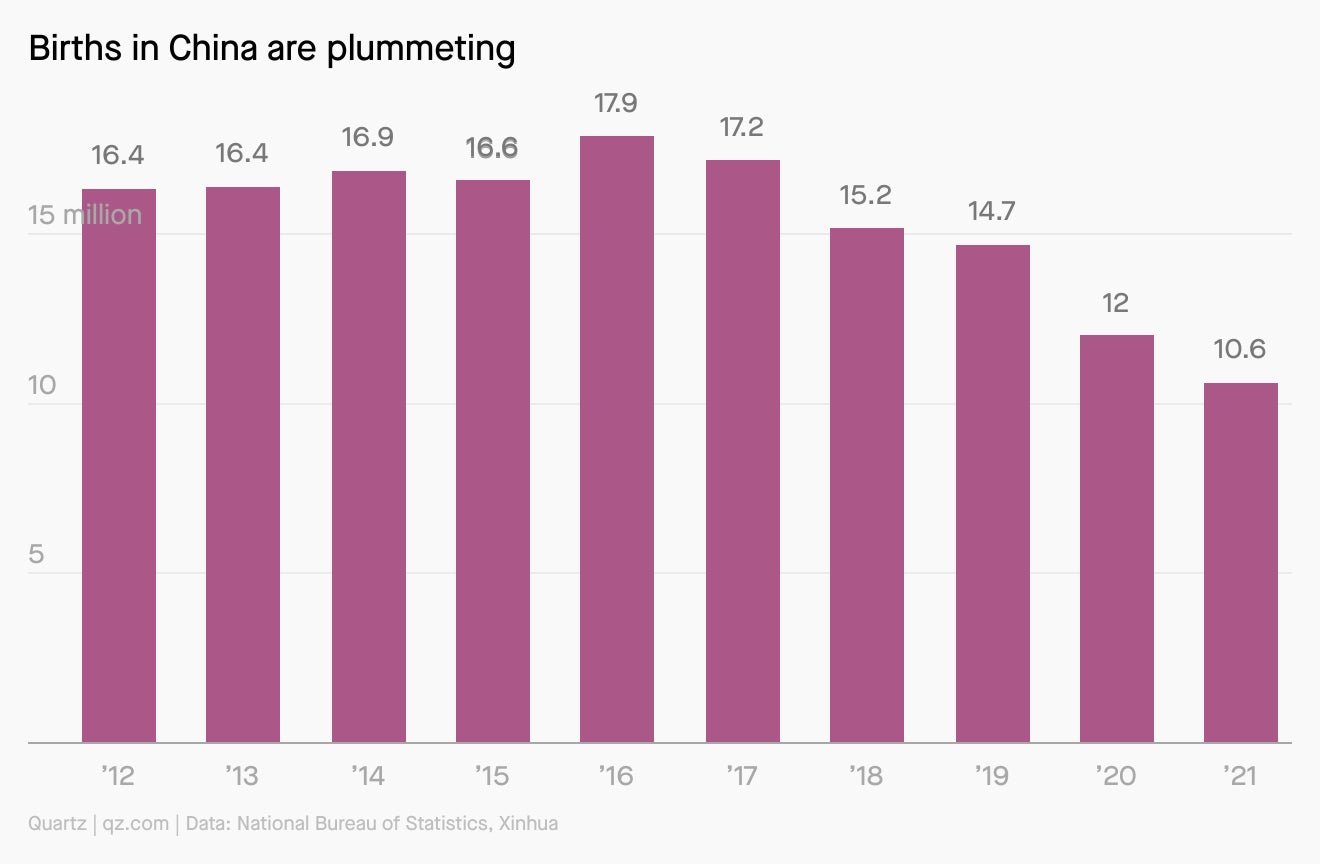
Quartz Announcements
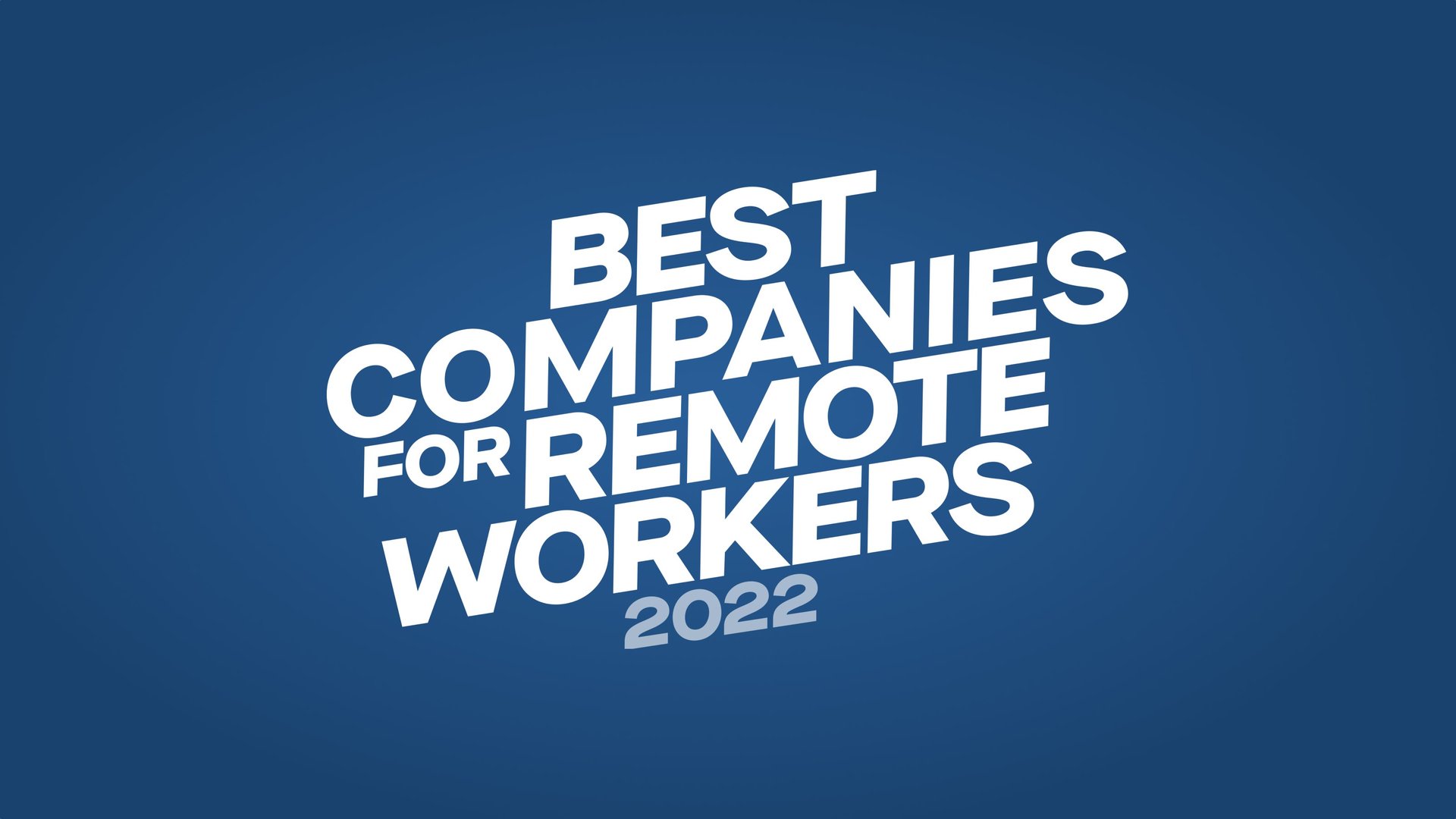
What’s the remote work experience at your company? We’re ranking the Best Companies for Remote Workers. Submit your company to see if it makes the list.
One of the best things about working remotely? You can listen to your podcasts without earphones on during your breaks!

General Electric almost passed over an executive for a promotion because leaders doubted his devotion to Six Sigma. How did the management theory become GE’s corporate religion? Quartz editor Oliver Staley explains in a recent episode of the Quartz Obsession podcast. Catch up before season two begins in February!
🎧 Listen on: Apple Podcasts | Spotify | Google
Enjoying our content? Won’t you give us your perspective? We love helping our readers navigate the global economy and deliver perspectives you won’t find anywhere else. Now, we want to hear from you. Complete our survey, and you’ll be entered for a chance to win a $250 Amazon gift card.
Other things we liked
An artist’s complicated relationship with Africa. For CNN, Earl Nurse writes about Nigerian rapper and singer Burna Boy’s love-hate relationship with his country and continent.
Putting Zimbabwe on the global wine map. For the Guardian, Nyasha Chingono introduces a new generation of Zimbabweans who, after leaving due to the country’s economic crisis, are coming back home to create a wine industry.
Watch out for female filmmakers in the Ethiopian diaspora. For Africa Is a Country, Steven W. Thomas explores the generation of artists and journalists who live outside Africa, and who garner critical acclaim for how they tell their countries’ stories.
What attracts tourists to the end of the Earth? For the New York Times, Genna Martin writes about a trip to Namibia, using photographs to reconcile the eeriness and serenity of its coastline.
ICYMI
Robotics and AI in Africa. Tech Unite Africa, a conference, exhibition, and networking platform, will take place in Lagos, featuring topics including robotics, artificial intelligence, and data privacy. (Jan. 28 and 29)
Southern Africa’s economic outlook. Invest Africa will hold an event to discuss the region’s prospects in 2022. (Jan. 31)
Combating digital threats. Cyber Intelligence Africa 2022 will take place in Johannesburg, where regional government representatives will discuss cybersecurity strategies and policies. (Feb. 8 and 9)
🎵 This brief was produced while listening to “Thiant” by Carlou D (Senegal).
Our best wishes for a productive and ideas-filled week ahead. Please send any news, comments, suggestions, ideas, gaming gear, and electric motorbikes to [email protected]. You can follow us on Twitter at @qzafrica for updates throughout the day.
If you received this email from a friend or colleague, you can sign up here to receive the Quartz Africa Weekly Brief in your inbox every week. You can also follow Quartz Africa on Facebook.